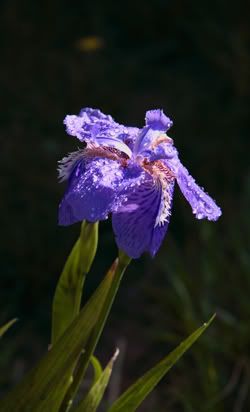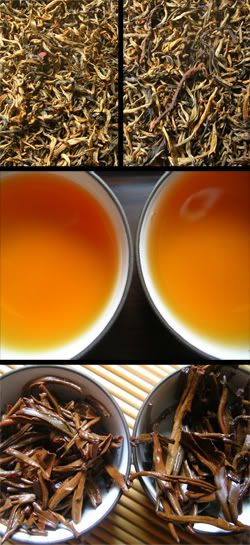 Thanks to the kind e-mails from readers who asked after our well-being - we were very fortunate not to be affected by the floods, unlike so many others who have to cope with the damage.
Thanks to the kind e-mails from readers who asked after our well-being - we were very fortunate not to be affected by the floods, unlike so many others who have to cope with the damage.Of course, the worst we suffered here (some houses without power, some damage to furnishings) is truly insignificant in comparison to the tragic impact of the flooding rivers in Mainland China last week, which the BBC reports as rendering 450,000 people entirely homeless, while 650 people are known to have died. When the British insurance agencies write at great length about the agony they experience over paying the monetary claims of their customers, one must put it into the context of the true suffering occurring in Sichuan, Shaanxi, Hubei, and Anhui provinces.
The photograph shown here of the fragile purple flower covered in raindrops [taken by WJ in the University Park - many thanks] seems particularly poignant.
Like the photographer of the purple flower, the Dianhong [Yunnan red] teas described below are also from Beijing, having been acquired by Lei on Maliandao.
"Youji Hongya" [organic red-tip] is 55 RMB / 100g [£3,$6], while "Hongyawang" [red-tip king] is 40 RMB / 100g. These two appear left and right in the accompanying photographs, and will referred to as YJ and HYW, respectively. The same brewing parameters were used for both teas.
Brita-filtered water @ 100C in 10cl hongcha pot; ~5g leaf; 1 rinse
Dry leaf:
The YJ is almost entirely made of small, yellow tips, the first pick of spring. The HYW is made of large, sultry tips (perhaps left to age on the bush, in comparison to the YJ), and is mixed with some darker leaves, representing its slightly lower grade.
 12s, 12s, 15s, 20s:
12s, 12s, 15s, 20s:Both brews appear identical, being the classic deep amber of Dianhong.
Though the claims of the YJ to be organic are laudable, I was a touch disappointed in it: though malty, tangy, and sweet, as one would hope from a Dianhong, it lacked much excitement. It has a decent texture, but is not the pure luxurious silken experience that we found with the 2006 "Gold Tips" or (to a lesser extent) the 2006 "Pure Buds", both from Yunnan Sourcing. There is little ku, and not much in the way of huigan.
The HYW, by comparison, was higher and clearer in its flavour, with a definite enervating sensation to be experienced on the surface of the tongue. It was a particularly lively tea, and exhibited the full-bodied appeal that I like to advise people to look for in a Dianhong.
Wet leaf:
YJ: Some stems, some broken leaves, some tips.
HYW: Big and beautiful, with no fragments at all.
Overall:
Though the YJ was the more expensive tea, the HYW was by far the better. I like to try and learn something from every tea session, and this was an interesting lesson in the possibly inflated prices that "organic" teas can attract.
I use speech-marks around the "organic" as the entire notion of organic certification is, to my understanding, a mutable concept in the current production environment of Mainland Chinese teas. I have heard tell of several certified-organic producers who revert to more conventional (read: inorganic) treatment methods once the qualification has been achieved. Certainly, I have heard such stories in sufficient quantity as to invoke a healthy degree of caution when listening to the claims of tea producers.

9 comments:
"Organic" is a mutable concept in any country. Thankfully, part of the organic nature of life is that it is constantly changing. It is difficult anywhere 1) to define the qualifications for organic certification, 2) to determine qualification on individual farms, and 3) to continually police farms that are certified. Here in California, being of the most progressively "organic" legislative bodies, several counties have gone as far as to prohibit the use of GMO's (genetically modified organisms) on any farm, because airborne GMO pollen was pollinating organic farms and causing them to lose the purity of their non-GMO crop as well as lose their organic certification. This is just one of the many touchy issues at play in the organic world. I think we should always question organic certification, no matter what country is giving the stamp of approval. I am wondering, though, why you think China is especially concerning? I'd like to hear your stories that call their ability to police organic certified farms into question. It seems that they have very similar standards as those of the U.S., although China has two levels of certification. The "green food" (A grade) level permits some synthetic pesticides and fertilizers, where the "organic food" (AA grade) level does not.
You've hit on an interesting issue here! Thanks!
Dear Perplexd,
Thanks for the detailed comments - California has a reputation as being one of the most progressive states, and its interesting to hear how organic standards are met there.
Standard Mainland Chinese business practices are fairly... Byzantine, I think it's fair to say. In the absence of strictly-enforced controls, a business (certainly not just tea) can engage in surprisingly unpleasant practices in order to increase its margins. Most of our Chinese friends say that there isn't anything that can't be solved "over dinner" (i.e., with financial inducement). Things are changing, though, and definitely moving in the right direction. It will all look a lot different in a decade's time, I suspect.
Toodlepip,
Hobbes
I think another thing worth thinking about is that not having organic certification does not necessarily mean the farm is non-organic either. It just means nobody has bothered to certify them (i.e. paid the fee and associated cost of the whole process -- which translates into higher tea prices).
I've had something like the HYW before. Not bad, although personally I'm not a big fan of dianhong, preferring the lighter Qimen or the smokier Lapsang. Dianhong is a touch too malty for me, I think.
I used to work for a local farmer selling his produce at the SF Farmers Market. Andy, the farmer, has been in the "organic" farming trade for close to 25 years, and has the highest reputation in the California farming world -- selling to restaurants such as Chez Pannisse, Fifth Floor, etc.
A few years ago, when the organic standard moved to a federal regulation, Andy chose not to renew his certification. He felt that the standards were too lax, and the cost of certification too high. He now depends on his reputation and word-of-mouth.
I think a similar situation occurs around the world -- many farmers, including wine grapes, coffee beans, tea, etc may follow traditional methods, but can't afford the cost of certification. And, as pointed out above, a certificate is by no means a guarantee of quality.
Organic is a problematic subject indeed, even in the UK. The only difference that I can see in "supermarket" organic (for example) is that the grades of (for example) apples are lower, so they are tastier. Often I find that Tesco Value and Tesco Organic apples and pears are, to an extent, exactly the same...
Oh, and I too find dianhong a bit too... malty? I'm not sure of the word to describe it really :)
-vl.
PS.
Beautiful picture...
It's good to note the flip-side. Certainly in Europe, the "organic" brand has really been burned into the minds of the consumer, to the point where "inorganic" is associated with the use of fertilisers and pesticides during production, then artificial colours, preservatives and antioxidants during processing. It's not accurate, as you rightly point out, but it's there.
It's long been my belief that the only way to obtain truly delicious produce is to grow one's own. A small vegetable patch if you're fortunate enough to have a garden can work wonders. It's the antithesis of the modern consumer mentality, and I love it.
Dianhong: CB was kind enough to send me some of Yunnan Sourcing's best Dianhong, as I mentioned in the main post, which is head-and-shoulders above any other I've tried, even those obtained from the next province over. It might be worth a look! It's still going to be malty, but the bizarrely silken texture makes it fascinating.
Lest we forget, no discussion of hongcha would be complete without mention of so-called Sichuan Gongfu - a definite favourite.
Thanks very much for the comments, and toodlepip,
Hobbes
P.s. VL, I didn't notice that supermarket organic produce was a lower grade - or did you mean the whole range of produce is generally of lower grade? I definitely agree with that, if so.
One of the great places to get good vegetables is via one of the home-delivery services, such as Abel & Cole. As I'm sure you know, compared to supermarket food, the quality is like Heaven and Earth - plus, it has the pleasing effect of not pouring more money into supermarkets (one of my pet discomforts in the modern world).
I'm sure you've seen Walmart: The High Cost of Low Price. If not, it's worth a look. I seem to recall that this charming outfit owns the UK "ASDA" chain of supermarkets.
For apples and pears the grades that are usually found are I and II, where the "better" grade is larger and rounder, more formed. The lower grades are smaller, sweeter, juicier, and less pleasant in appearance. So sometimes the best pears in Tesco are the Value ones, imho. I think they are done purely on appearance and size.
In Manchester they have an "organic" (and vegan) shop called Unicorn (in Chorlton, where else) where they have lots of things organic in a rather crazy atmosphere, if you know what i mean, the prices are OK... but just across the road the have a small grocer with a slightly Asian twist. Better fruit, lower prices, less crazy atmosphere... Of course most people choose the former.
-vl.
A good discussion of "organic" can be found in Michael Poulan's "The Omnivoire's Dilemma". While the USDA definition does keep tons of mined nitrogen and tons of pesticides from being dumped onto the soil and running off into streams and rivers, and also excludes GMO crops, it does not really address the whole cycle, regionally specific, sustaniability issues which do not have a "one size fits all" solution.
Vlad,
Ah, the modern organic grocer - half food merchant, half fashionista! At least they're coming back, in defiance of the supermarkets. At the risk of saying "When I were a lad":
When I were a lad, there used to be greengrocers in every High Street. Now, there's only Tesco and Friends. Though they may look silly, and I'd never shop in them, I do welcome the emergence of the modern organic stores.
Is Chorlton far for you? I seem to remember it not being a million miles away.
Carla,
Thanks for the reference; by odd coincidence, that's on my list already - maybe it was you that put it there!
Toodlepip both,
Hobbes
Post a Comment